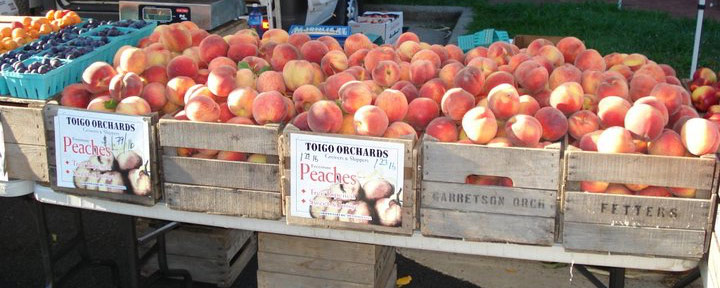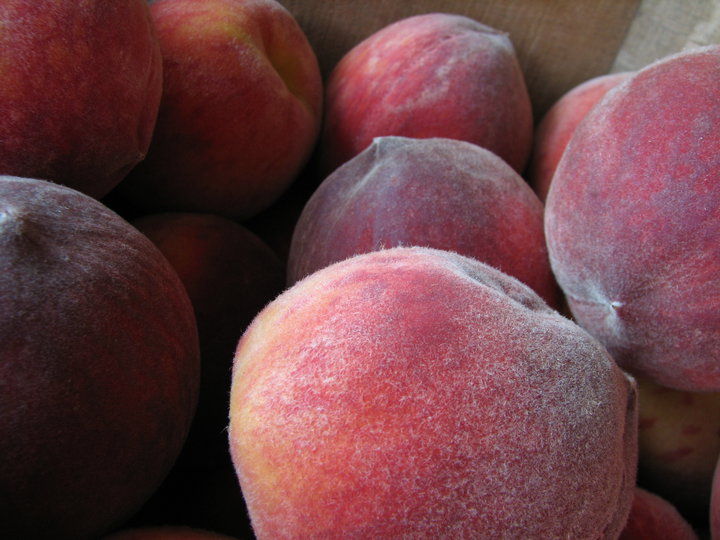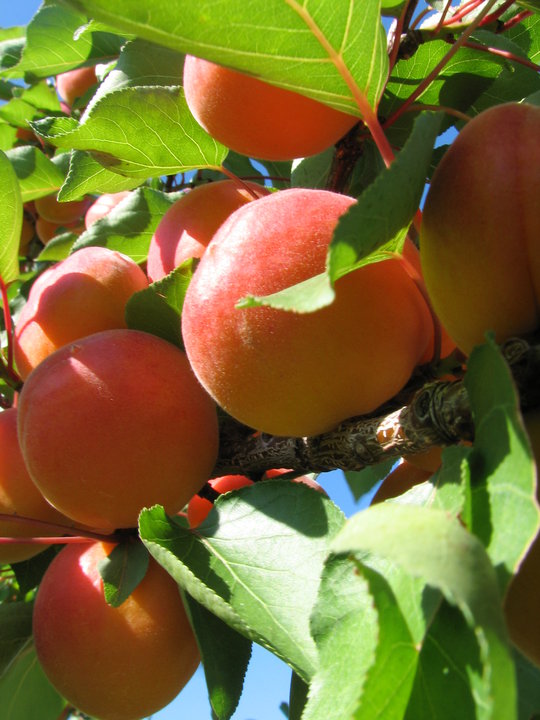If ever there were an official competition to name the fruit-least-suited-to-being-shipped-to-faraway-supermarkets, prolonged arguments no doubt would rise among food lovers across the land.
The tomato, of course, would be a contender for the title. (Granted, the tomato most often is used as a vegetable, but botanically, it’s a fruit, so it qualifies for this imaginary contest.) Each of the various berries, as well as cherries, would make a strong showing. But when all the votes were tallied, no one would be surprised if the top honors were to go to the peach.

“Peaches have to stay local in order for them to be brilliant,” said Jeffrey Buben, chef and co-owner of the restaurants Vidalia and Bistro Bis in Washington, DC. “They should be eaten as soon as possible after being picked from the orchard. The ripeness, the right time to pick, these things are everything in a peach.”
Buben and other chefs who seek out local, seasonal ingredients harbor a special affinity for the peach.
“When it’s peach season, I believe in eating as many peaches as you possibly can, all the time, in everything,” said Carole Greenwood, chef and co-owner of Buck’s Fishing and Camping restaurant in D.C. “Because that’s it. For that brief window every year, you can eat fresh peaches every single day. And for the rest of the year, you can’t.” She pauses. “I mean you can, but you shouldn’t. You could buy a peach in the supermarket, but it would never taste like a local peach in the moment when it’s fresh and ripe.”
For her peach fix every summer, Greenwood turns to Toigo Orchards of Shippensburg, Pennsylvania, about 100 miles northwest of Washington. It’s a 450-acre farm that has been in continuous operation since the 1700s and in the Toigo family since the late 1960s. About 380 acres are used to grow fruit, and of those, sixty acres are dedicated to peaches. As of this season, Toigo Orchards grows some 22 varieties of peaches, with two or three test types in the works.
“It’s insanity for anyone to have all the different varieties we have,” Mark Toigo said, laughing. “It’s quite common for a peach grower to have two or three varieties. But this many? Walking through our peach orchards is like walking into a maze.”
Mark Toigo, 43, in recent years has spearheaded Toigo Orchards’ efforts to grow and sell peaches primarily for freshmarket consumption, through farmers markets and directly to restaurants, rather than for the traditional wholesale industry.
“We know what these direct customers want: different varieties, less chemicals, better, fresher, riper fruit that is grown closer to where they are,” said Toigo.
For many customers at farmers markets in metropolitan D.C. and for a number of local chefs, Mark Toigo is the guru of peaches.
“Mark is very hands-on and he brings the best to the market every week,” said Buben, who has bought peaches from Toigo Orchards for the past 13 years. “He’s willing to experiment with different varieties and seeds, so he keeps things interesting.”
At Buck’s, Greenwood uses Toigo peaches to make peach ice cream, peach cake and a much-requestedcustomer favorite: a salad of roasted white peaches, fresh mozzarella, white balsamic vinegar, olive oil and basil.

“Mark’s peaches are exceptional,” she said. “I can buy peaches from anyone, but I just find Mark really knowledgeable. I’ve been to his farm, I know what he does and I like his approach.” To grow these sought-after peaches, Toigo uses sustainable farming practices, including integrated pest management, a complex, labor-intensive approach aimed at using minimal amounts of selected pesticides to protect the fruit from pests that are ubiquitous in the Chesapeake region’s humid climate.
“We can’t grow organic peaches here, it just doesn’t work in our environment,” said Toigo. “But we are a low-impact grower, which is damn close to organic.”
Indeed, a 2003 report by the National Sustainable Agriculture Information Service concluded that “commercial-scale organic production of peaches in the East would be very difficult” because of the pests that thrive in the wet, muggy conditions. Customers at farmers markets at times express concern the peaches are not organic. In response, Toigo could detail how he contracts with an entomologist who uses pheromone traps to monitor the trees throughout the year and how he introduces beneficial insects to help fight troublesome pests and how these and other techniques enable Toigo Orchards to use low-spray methods, limiting pesticide use to the lowest possible levels. But he finds sometimes it’s most effective to just take a bite of a peach.
“You do not have to worry about picking up one of our peaches and eating it,” he said. “People will say they’re concerned about what’s on the peach. Being that our house and our farm and our lives are surrounded by the fields where the fruit grows, we care more than anyone else whether it’s safe. We literally live thisfruit on a daily basis, so we are not going to do anything that is harmful to ourselves or our customers.”
Over the years, Toigo has staggered plantings so the peach varieties will ripen at different times, stretching out the peach season as long as possible. Most summers, at least two varieties will ripen each week, from July through mid-September.
“On those hot, humid days we get here, I swear to you, you can go out in the orchard and hear the peaches growing,” said Toigo. “The tree is just sucking moisture as fast as it can. It’s going through that breathing process, breathing in moisture and exhausting it through the leaves and through the fruit.”
The combination of Pennsylvania’s limestone soil and the orchards’ higher elevation make for ideal peach ripening conditions, he explained.
“The rich, fertile soil we have here holds the moisture well,” he said. “And in the dead of summer, you’re getting all the qualities of the hot days, but because we’re in the mountains, it cools off at night, so it slows down the ripening just a little bit, which gives the peach more time for the sugars to develop. Even that brief delay helps produce a more complex fruit.”
That fruit inspires devotion from longtime Washington chef Brian McBride, who has bought fresh Toigo peaches every summer for more than 15 years. This fall at his new restaurant, Blue Duck Tavern, McBride may try to hold onto peach season a bit longer by serving Toigo’s homemade preserved bourbon peaches with pork loin roast.
“The flavors work together unbelievably,” he said. “And it’s a good way to preserve the local summer bounty through the colder months.”

Still, for chefs and customers alike, there is nothing quite like those peach days of summer, when farmers markets overflow with fresh, local peaches so ripe that when you bite into one, the juice spills down your hands and arms and you don’t care because it tastes so good.
“There’s something about peaches that gets people excited,” said Toigo. “By May, customers are asking us ‘So when will the peaches start?’ They’ll plan meals around when the peaches will be here. One person will ask how to make peach cobbler and you’ll have eight people stop, pulling pens out of pockets so they can write down their recipes.”
“It’s part of the rite and ritual of the season,” he said. “When you think of summer, you cannot skip the peach.”
“You do not have to worry about picking up one our peaches and eating it,” he says. “People will say they’re concerned about what’s on the peach. Being that our house and our farm and our lives are surrounded by the fields where the fruit grows, we care more than anyone else whether it’s safe. We literally live with this fruit on a daily basis, so we are not going to do anything that is harmful to ourselves or our customers.”
Over the years, Toigo has staggered plantings so the peach varieties will ripen at different times, stretching out the peach season as long as possible. Most summers, at least two varieties will ripen each week, from July through mid-September.
“On those hot, humid days we get here, I swear to you, you can go out in the orchard and hear the peaches growing,” says Toigo. “The tree is just sucking moisture as fast as it can. It’s going through that breathing process, breathing in moisture and exhausting it through the leaves and through the fruit.” The combination of Pennsylvania’s limestone soil and the orchards’ higher elevation make for ideal peach ripening conditions, he explains.
“The rich, fertile soil we have here holds the moisture well,” he says. “And in the dead of summer, you’re getting all the qualities of the hot days, but because we’re in the mountains, it cools off at night, so it slows down the ripening just a little bit, which gives the peach more time for the sugars to develop. Even that brief delay helps produce a more complex fruit.”
The fruit inspires devotion from longtime Washington chef Brian McBride, who has bought fresh Toigo peaches every summer for more than 15 years. This fall at his new restaurant, Blue Duck Tavern, McBride may try to hold onto peach season a bit longer by serving Toigo’s homemade preserved bourbon peaches with pork loin roast.
“The flavors work together unbelievably,” he says. “And it’s a good way to preserve the local summer bounty throughout the colder months.”
Still, for chefs and customers alike, there is nothing quite like those peach days of summer, when farmers markets overflow with fresh, local peaches so ripe that when you bite into one, the juice spills down your hands and arms and you don’t care because it tastes so good.
“There’s something about peaches that gets people excited,” says Toigo. “By May, customers are asking us ‘So when will the peaches start?’ They’ll plan meals around when the peaches will be here. One person will ask how to make peach cobbler and you’ll have eight people stop, pulling pens out of pockets so they can write down their recipes. It’s part of the rite and ritual of the season,” he says. “When you think of summer, you cannot skip the peach.”
Toigo Orchards sells peaches and other fruit at Arlington Farmers Markets, FreshFarm Markets in Washington, DC and at several other farmers markets in metropolitan Washington.
Just Peachy
by Laurie Jones
Edible Chesapeake
Summer 2006
